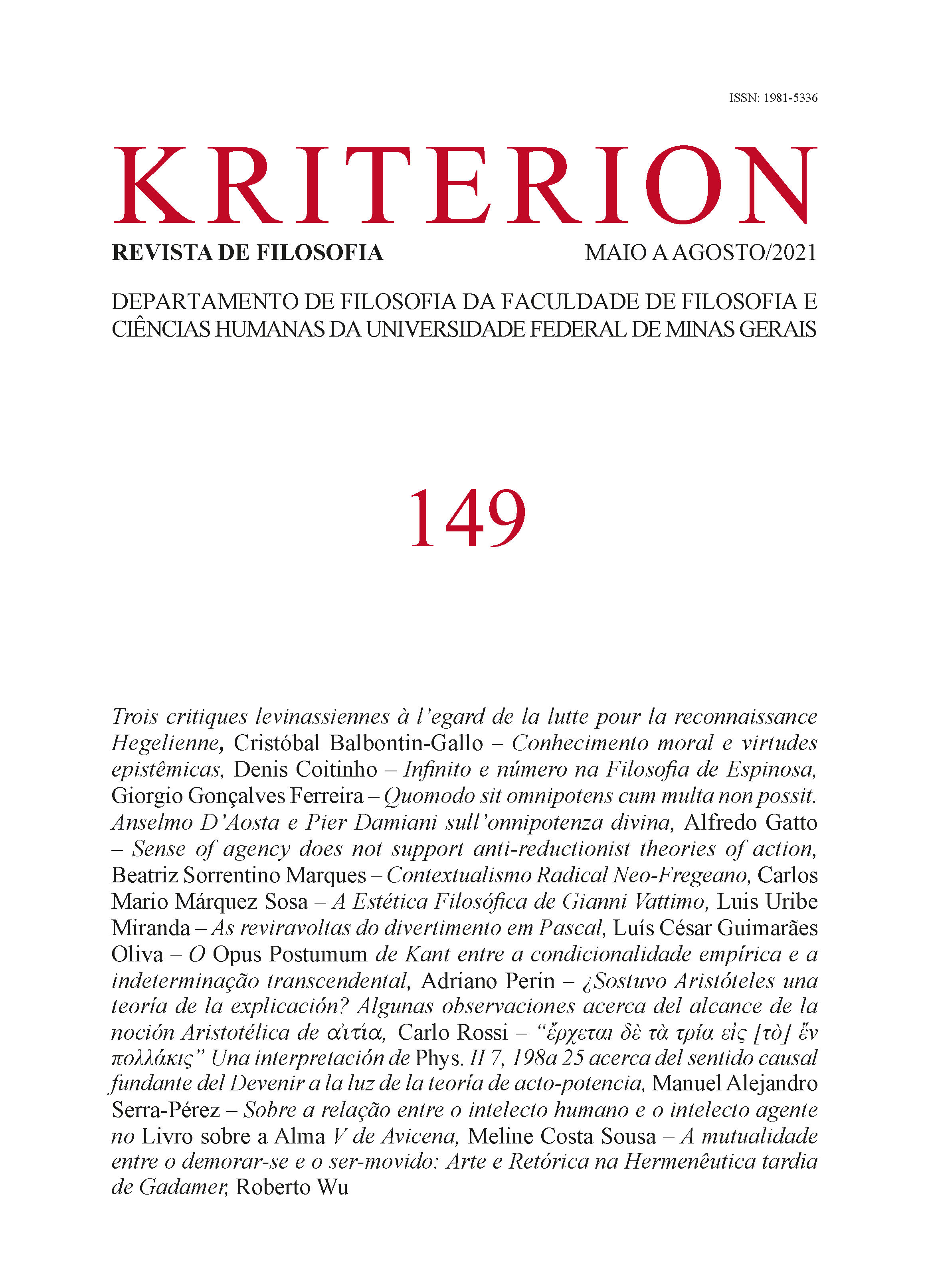CONHECIMENTO MORAL E VIRTUDES EPISTÊMICAS
Palavras-chave:
Conhecimento moral, Virtudes epistêmicas, Sabedoria prática, Humildade, IntegridadeResumo
O objetivo é refletir sobre o escopo do conhecimento moral a partir do modelo da ética das virtudes, que toma por base a ideia de caráter virtuoso e florescimento humano, sendo esta abordagem bastante promissora para responder ao argumento cético que diz que o desacordo moral é uma prova irrefutável da impossibilidade do conhecimento no campo da ética. Para este fim, inicio problematizando o conhecimento moral, com a consideração específica do raciocínio ético. Posteriormente, investigo o papel das virtudes epistêmicas de sabedoria prática, humildade e integridade para a aquisição do conhecimento moral. Por fim, postulo que a ética das virtudes, que conta com certas virtudes epistêmicas, pode explicar adequadamente o conhecimento moral e responder de forma mais eficiente ao ceticismo.
Referências
ANNAS, J. “Intelligent Virtue”. Oxford: Oxford University Press, 2011.
ARISTOTLE. “Nicomachean Ethics” (NE). Translation T. Irwin. 2a. Ed. Indianapolis: Hackett, 1999.
BOMMARITO, N. “Modesty and Humility”. Stanford Encyclopedia of Philosophy, 2018. Acessado em 25/09/2019.
BUCHANAN, A.; POWELL, R. “The Evolution of Moral Progress: A Biocultural Theory”. New York: Oxford University Press, 2018.
CALHOUN, C. “Standing for Something”. Journal of Philosophy, Vol. 92, Nr. 5, 1995, pp. 235-260.
CHISHOLM, R. “Perceiving: A Philosophical Study”. Ithaca, NY: Cornell University Press, 1957.
DePAUL, M. “Why Bother with Reflective Equilibrium?”. In: M. DePaul, W. Ramsey (eds.). Rethinking Intuition: The Psycology of Intuition and Its Role in Philosophical Inquiry. Lanham, Maryland: Rowman & Littlefield, 1998. pp. 293-310.
EINSTEIN, A. “The Ultimate Quotable Einstein”. Colleted and Edited by A. Calaprice. Princeton: Princeton University Press, 2010.
FISCHER, J.; RAVIZZA, M. “Responsibility and Control: A Theory of Moral Responsibility”. New York: Cambridge University Press, 1998.
GETTIER, E. “Is Justified True Belief Knowledge?”. Analysis, Vol. 23, Nr. 6, 1963, pp. 121-123.
GRECO, J. “Virtues and Vices of Virtue Epistemology”. Canadian Journal of Philosophy, Vol. 23, 1993, pp. 413-432.
HAMPSHIRE, S. “Fallacies in Moral Philosophy”. Mind, Vol. 58, Nr. 232, 1949, pp. 466-482.
LYNCH, M. “True to Life: Why Truth Matters”. Cambridge, MAS: MIT Press, 2005.
MACKIE, J. “Ethics: Inventing Right and Wrong”. London: Penguin Books, 1977.
McFALL, L. “Integrity”. Ethics, Vol. 98, Nr. 1, 1987, pp. 5-20.
McHUGH, C. “Epistemic Responsibility and Doxastic Agency”. Philosophical Issues, Vol. 23, 2013, pp. 132-157.
MILGRAM, S. “Behavioral Study of Obedience”. Journal of Abnormal and Social Psychology, Vol. 67, Nr. 4, 1963, pp. 371-378.
PLATO. “Five Dialogues: Euthyphro, Apology (Ap.), Crito (Cri.), Meno, Phaedo”. 2nd Ed. Translation G. M. A. Grube. Rev. J. Cooper. Indianapolis: Hackett Publishing Company, 2002.
ROBERTS, R. C.; WOOD, W. J. “Intellectual Virtues: An Essay in Regulative Epistemology”. New York: Oxford University Press, 2007.
ROBERTS, R. C.; WOOD, W. J. “Humility and Epistemic Goods”. In: M. DePaul, L. Zagzebski (eds.). Intellectual Virtue: Perspectives from Ethics and Epistemology. Oxford: Clarendon Press, 2012. pp. 257-279.
SCHERKOSKE, G. “Could Integrity be an Epistemic Virtue?”. International Journal of Philosophical Studies, Vol. 20, 2012, pp. 185-215.
SLOTE, M. “Goods and Virtues”. Oxford: Clarendon Press, 1983.
SMITH, A. “The Theory of Moral Sentiments” (TMS). D. D. Raphael, A. L. Macfie (eds.). Oxford: Oxford Universit Press, 1976.
SOSA, E. “A Virtue Epistemology: Apt Belief and Reflective Knowledge”, Vol. I. Oxford: Clarendon Press, 2007.
STEVENSON, C. “The Nature of Ethical Disagreement”. In: Facts and Values. New Haven: Yale University Press, 1963. pp. 1-9.
WILLIAMS, B. “A Critique of Utilitarianism”. In: J. J. C Smart, B. Williams (eds.). Utilitariasnism For and Against. Cambridge: Cambridge University Press, 1973. pp. 77-150.
ZAGZEBSKI, L. “Virtues of the Mind: An Inquiry into the Nature of Virtue and the Ethical Foundations of Knowledge”. Cambridge: Cambridge University Press, 1996.










